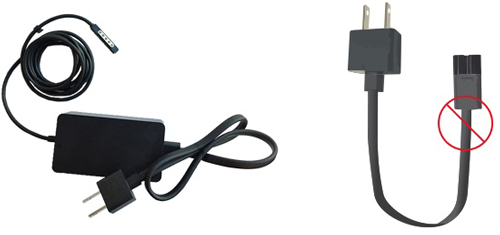Microsoft Recalls 2 Million Surface Power Cords
Microsoft is recalling 2.44 million AC power cords for Surface devices sold in the U.S. and Canada due to fire and shock risks.
According to a recall statement published Tuesday by the U.S. Consumer Product Safety Commission, "Microsoft has received 56 reports of the AC cords overheating and emitting flames and five reports of electrical shocks to consumers."
 Affected Surface power cords include ones sold separately (left) and do not have a 1/8-inch sleeve on the end that connects to the power supply (right). Source: Consumer Product Safety Commission.
Affected Surface power cords include ones sold separately (left) and do not have a 1/8-inch sleeve on the end that connects to the power supply (right). Source: Consumer Product Safety Commission.
The affected power cords were manufactured in China, Taiwan and the United Kingdom, and were sold either standalone or bundled with a Microsoft Surface Pro, Surface Pro 2 or Surface Pro 3 computers before March 15, 2015.
The recall affects 2.25 million units in the United States and 190,000 in Canada. In the United States, the products were sold online at Microsoft.com or at Microsoft Stores, Best Buy, Costco and other stores between February 2013 and March 2015.
Posted by Scott Bekker on February 02, 2016